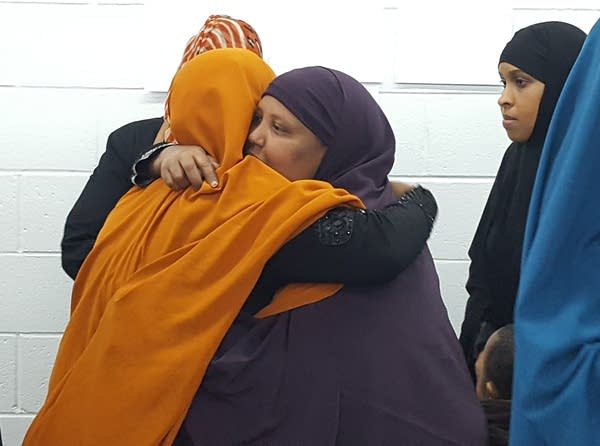Bloomington father of 3 killed in Somalia bombing

A Bloomington man who fled Somalia in the 1990s had returned to the country for a short trip and died in Saturday's truck bombing in Mogadishu.
The body of 50-year-old Ahmed Eyow was found in the rubble of a hotel in Mogadishu, according to his brother Bashir Eyow of Minneapolis.
"We don't know what time he died, but we know as soon as he arrived in Mogadishu, after three hours, bombs crashed into the hotel," Eyow said on Sunday. "We looked for him for many, many hours, almost 10 hours. After that, we found him in the ruins."
Eyow had to get updates on his brother from afar. Sunday afternoon he and other family members gathered in Bloomington at his brother's mosque, the Dar Al-Farooq Islamic Center.
Create a More Connected Minnesota
MPR News is your trusted resource for the news you need. With your support, MPR News brings accessible, courageous journalism and authentic conversation to everyone - free of paywalls and barriers. Your gift makes a difference.
Eyow said his brother has three children. Ahmed Eyow's wife, Ruun Abdi, said he graduated from Metropolitan State University and Normandale Community College before that.
"He loved America so much," said Abdi. "And he was hoping to go and help Somalia ... we miss him so much. I want people to know he was a great father. He had two jobs, helping us very much. He worked so hard."

Their son, Yonais Abdikarin Eyow, said that at first, he didn't believe the news, but once his father's body was found, reality set in. The young Eyow recalled what his dad said to him before traveling overseas.
"He told me, before he went to Mogadishu, he said, stay strong, I want you to take care of your mom."
Like thousands of other Somalis in Minnesota, Ahmed Eyow fled Somalia as a refugee in the early 1990s, when the government there collapsed.
Eyow arrived in the United States in 1998, and settled in Minnesota, working as a welder. But his hope was to one day work as a representative for the United Nations, to help rebuild Somalia.
Jaylani Hussein of CAIR-MN called Ahmed Eyow a close friend.
"He had a very short trip planned," said Hussein. "Unfortunately, he lost his life on his first day in Somalia. He was planning to come back and be with his family. This is a horrible tragedy for both his family, and the entire community."
Abdi Aynte, who used to live in Minnesota, is grieving too. He's a former minister in the Somali government, and also a former journalist. Speaking from Mogadishu, he said he arrived in the capital from Nairobi where days earlier, he had coffee with Ahmed Eyow.
Aynte added that he could still smell the bombings from the airport.

"It's just unbelievable," said Aynte. "It's one of those things. I mean the images you see immediately is what you would see in the Hiroshima attack, and I've been to war locations many times, but this is just new to me."
Jibril Afyare shares this feeling, too. The president of the Twin Cities Somali American Citizens League was in Mogadishu when the bombs went off.
"This was a sound that I've never heard," he said. "This was a huge, huge blast, that shook our vehicle, shook our windows, the surroundings. This is a sound I've never heard, and will never forget."
Afyare said he was on his way to visit his uncle and two cousins. Hours after the blasts, he learned that all three died in the truck bombing.
Over the weekend, he tweeted a photo of himself donating blood at Madina Hospital, urging others in Mogadishu to do the same to help survivors.